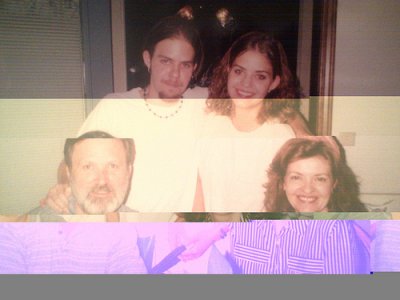“Why Do My Parents Hate Me?”

By: Jon Phillips
by Andrea M. Darcy
Living with the idea that ‘my parents hate me’ is very hard. It leaves us with very low self-esteem.
Why would someone bring us into the world only to be unkind to us, or leave us feeling abandoned?
[Suffering anxiety or depression about family issues? Feel alone? Book a therapist you like at a price you can afford and be talking to us as soon as tomorrow.]
Do my parents really hate me?
It is true that some parents have serious issues with loving their child. This would not be about the child, but about the parent. Their deep-rooted issues would stop them from connecting with their children (more on this below).
And it is true that some people have kids by accident, or because they thought they had to, and their personality just isn’t cut out for being a parent.
But it is more common that the issue is not that your parents hate you, but that they don’t always like you (much as you probably don’t always like them).
Different ways of showing love
If your parents actually do love you, why don’t they show it? Well they might be, actually.
Most of us make a big assumption that we all give and receive love in the same way. But we don’t. We all have different personalities, and this affects the way we love.
Troubles arise when two people have clashing loving styles. If one person shows love in the form of actions, and another wants to receive love in the form of words? Than both parties can be left feeling frustrated and disconnected.
- How might your parents give love in ways that you haven’t considered?
- How is it you want to be given love?
- Have you ever told your parents how you would like to be shown love, or what you would like from your relationship with them?
When personalities clash

By: wsilver
Just like it’s impossible to get along with everyone at school or work, we sometimes just don’t get along with people in our families. Our personalities are just too different.
The problem is that when it comes to family, we have history that we can bring to every situation. We become blinded by emotion, unable to see the situation we are dealing with here and now. We can’t find the compromise we need to end the conflict, even if when we have conflict with friends or colleagues we can do so easily.
- If your parents were not your parents but your colleagues or fellow students, what would you do to make it easier to get along?
- If your parent was a stranger you just met that you needed to do a project with, what would you be willing to overlook and accept about them?
It’s all about attachment
Attachment theory believes that for a child to grow up into an adult who can trust and connect to others, they need to have had at least one reliable caregiver from birth to mid-childhood.
A child needs to be able to trust this caregiver to always love them, no matter what their behaviour or what they say.
If your parent didn’t get this sort of reliable parenting, then they might find it hard to ‘attach’ to others, including you, their own child. Attachment disorders include ‘avoidant attachment’ (aloof, don’t connect) and ‘anxious attachment’ (clingy or push pulling and confusing).
Of course is your parent has attachment issues, unless your other parent or guardian was very reliable and compensated, you yourself might have attachment issues.
The power of personality disorders
If a parent really doesn’t like their child, it can sometimes be because they have a personality disorder.
A personality disorder means that we consistently see the world in a different way than most people. This means we think and behave in different ways to others that make connecting with others really challenging, including our own family.
But personality disorders affect a much smaller percentage of the population than poorly researched articles declaring everyone a narcissist would have one believe. It’s more likely your parent has a psychological issue.
Why parents have no love to give
What sort of issue could stop a parent from loving a child? And leave you feeling, ‘my parents hate me’?
Addictions are an obvious one. An addict puts his or her addiction first, even before their own children. Sometimes what is addictive is a relationship. If your parents are addicted to each other, with constant drama and fighting followed by making up, they might have no emotion left for their kids.
Often it’s the case that parents had traumatic experiences in their past. Trauma can directly affect someone’s capacity to love and trust others.
Or it might be that your parents never felt loved by their parents, and are continuing the cycle. They might be psychologically projecting their fury with their parents onto their children, or even be jealous of you if you are happier than they feel.
What can you do if your parents really don’t love you?
If you feel unloved by a parent it will directly affect your self-esteem and your ability to have healthy relationships with others.
We need to learn what loving, trusting, healthy relationships even are if we didn’t get one from our parents. And then we need to learn to ‘reparent’ ourselves. This means we find ways to give ourselves the support, trust and love we didn’t get then or now from our parents.
It’s admittedly a big learning curve. You are having to compensate for an entire childhood of feeling rejected. So seeking support is highly recommended. A counsellor or psychotherapist can help you process the emotions that feeling unloved has left you with. You can find a way to handle your parental relationship in a way that works best for you, and learn tools to gain back the self-esteem your childhood didn’t provide.
Need help with family issues? Harley Therapy connects you with some of London’s best therapists. Not in London? Our booking platform connects you with UK-wide therapists, and online therapists even if you are in a different country.
 Andrea M. Darcy is a health and wellbeing expert, trained in person-centred counselling and coaching. She often writes about trauma, relationships, and ADHD, and advises people on how to plan their therapy journey. Find her on Instagram @am_darcy
Andrea M. Darcy is a health and wellbeing expert, trained in person-centred counselling and coaching. She often writes about trauma, relationships, and ADHD, and advises people on how to plan their therapy journey. Find her on Instagram @am_darcy






I can attest to the recovery from living with parents who didn’t love me. I’ve been in therapy for about 10 years and the 2 most meaningful statements my current therapist (Who I’ve been with for 3 years) has said to me are “the goal of therapy is to get you out of therapy,” and “you may not be able to repair your inner core completely, but you can tweak it to what works for you today.”
These are both true. I did the work and am thriving after surviving. I developed a positive self-esteem while learning to love and respect myself.
In summary, if we were negatively programmed as innocent children, then we can choose to be positively re-programmed as adults.
I’m 60 years old, and it’s never too late to make a choice of becoming a new person.
Wow thanks for sharing Cathy, we are so glad to hear this. It truly is never too late, we tell everyone this, we are afraid most people don’t want to believe it, glad to have this share about how true it is!
I feel sometimes my parents hate me, this helped me a lot thnx and made me understand what is the value of my parents
Glad to hear it!
This is a good article thank you. My brother abused me as a child. I tried to tell my parents about it at the time and again around a year ago and now they just ignore me apart from talking to my kids. They treat me like the black sheep of the family. As I’m getting older it’s affecting every part of my life. I can’t make any friends and my kids are starting to hate me as I am always down and a drag to them. I hate myself and my brother and my parents. I feel so lonely and pathetic. I have tried nhs therapy but it was a very set pattern and did not help at all. I can’t pay for private therapy and I’ve started to look at other ways out. I really don’t know what to do.
Caz, if you are on a low budget, know that these days there is therapy for every budget. We have an article here on sourcing low cost or even free counselling http://bit.ly/lowcosttherapy, and some counsellors on our booking site can offer therapy for as low as £25 a session https://harleytherapy.com/. It can require budgeting and prioritising, but it’s a worthwhile priority. For example, many people in the UK easily spend more than £25 a week on alcohol or takeaways. Therapy definitely offers far more in the long run, it’s a good investment. We’d imagine the NHS offered you CBT therapy. It can seem rigid and boring and annoying, yes, but it’s retraining your brain, and if you had trauma like abuse, this can really help you stabilise and lower emotional reactivity before you try a therapy that talks a lot about the past that could otherwise trigger you (read our article on therapies that work for trauma for more on this). Therapy is not meant to be fun or a walk in the park, it can be boring and hard sometimes. But we do understand that each person is unique and not all types of therapy are for everyone. Therapy is also a relationship, you need to find a counsellor you feel you can grow to trust, if not like right away (with an abusive past it’s highly unlikely you like or trust people easily and a therapist will be no different). You might also want to try going back to your GP and say that type of therapy didn’t work for you and demand another. You have to be pushy with them sometimes. Don’t overlook self help as well. There is a ton of info out there these days, from self help books to forums to Youtubers like the Crappy Childhood Fairy. Sometimes connecting with others who ‘get it’ can be a tremendous relief. We are sorry we can’t offer a quick fix, but we can tell you that change and improvement is absolutely possible, but step by step. Keep going. We wish you courage. Best, HT.
My parents always either ignore me, scold me, get me unfair or mock me. Sometimes I feel like i’m the only human in the universe like this but then other times I think i’m the worst human ever made and wonder why God ever made me. I feel a half percent happier when i realize im not the only one…